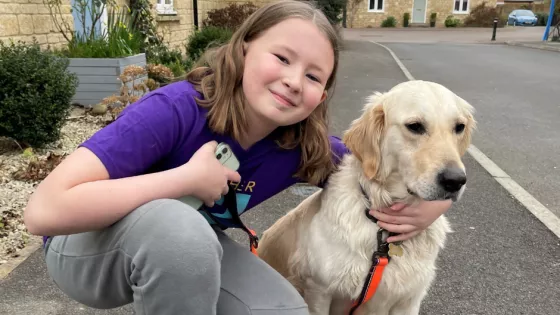Dogs are more than just great pets – they can be trained to support humans with particular needs. Seizure dogs are support dogs that can help some people with epilepsy. But what is a seizure dog? How they can help? And who might qualify to be paired with one?
What is a seizure dog?
A seizure dog is a support dog specially trained to support a person when they have seizures. They can empower some people with epilepsy to lead more independent lives. Living with a seizure dog isn’t quite the same as having a pet – they’ll be with you 24 hours a day, wherever you go.
What do seizure dogs do?
Seizure dogs can be trained to support people in a number of different ways.
- Seizure alert dogs can detect when someone is about to have an epileptic seizure. The idea is that they alert their owner to what’s happening before the seizure starts, and the early warning means the person can make sure they’re safe and seek help if needed before the seizure starts.
- Seizure assistance dogs stay with the person while they are having a seizure. They might lie by their side to prevent injury and offer comfort. They can also stop the person from doing something dangerous, like venturing onto a road.
- Seizure response dogs are trained to keep their owner safe when the seizure happens. For example, they might bark to attract attention from a family member, or summon help with an alert button.
Depending on the training a seizure dog receives, they might be able to play more than one of these roles. In the UK, epilepsy seizure dogs are trained by an organisation called Support Dogs, and the focus is on seizure alerts.
How can seizure dogs help?
A bit like guide dogs for blind people, service dogs can help people with epilepsy to live more independently, without always relying on others. For example, if you normally wouldn’t risk having a bath when nobody’s home, a seizure dog could allow you to do that – because you know they would warn you with 100% reliability if a seizure was on its way. Your seizure dog can also be a companion and a comfort.
Living with epilepsy means living with risk. A seizure dog can reduce that risk. Sadly, around 1,000 people with epilepsy die every year, and many of these deaths are sudden and unexpected. Seizure dogs can help save lives, by allowing you time to remove yourself from a dangerous situation if a seizure is about to happen.
How can I get a seizure dog?
Seizure dogs aren’t available to everyone. Support Dogs UK is the only organisation in the country that trains and provides seizure dogs for people with epilepsy. There’s a strict set of criteria that you need to meet, if you want to be considered. These include:
- a confirmed diagnosis of epilepsy
- at least 10 ‘major’ seizures a month
- 16 or over
- able to meet the dog’s needs for a home
- a stable course of medication that doesn’t change throughout the process of assessment and training.
You can read all the criteria on the Support Dogs website. If you fit the bill and you’re still interested, you can register your interest and visit an information day, where you’ll find out how it all works. Only after this can you fill out your application form!
If you are accepted for a seizure dog pairing, the training process isn’t quick, and it involves you both. You’ll spend three weeks at a training centre learning dog handling, before having a placement with your allocated dog at your home. Finally, when your seizure dog comes to live with you, you’ll be treated as an ‘in training partnership’ for the first six months. After that you’ll be assessed for graduation – when, if successful, you’ll be registered as an assistance dog team. Phew!
A step towards independence
It is possible to live independently with epilepsy – and for those who qualify, a seizure dog is one option. It’s a big commitment, but the difference it can make to your life could be worth it.
For more information and to take the next steps, visit the Support Dogs website to register your interest.


